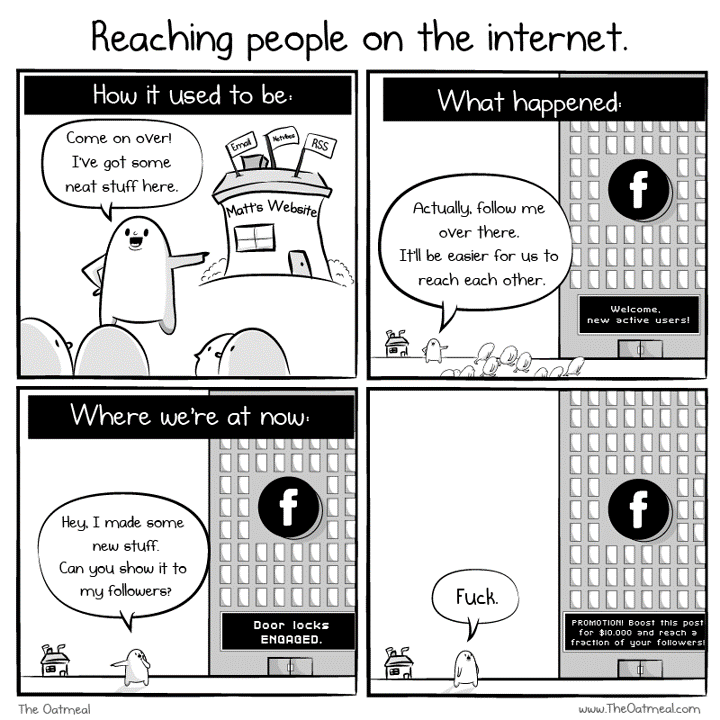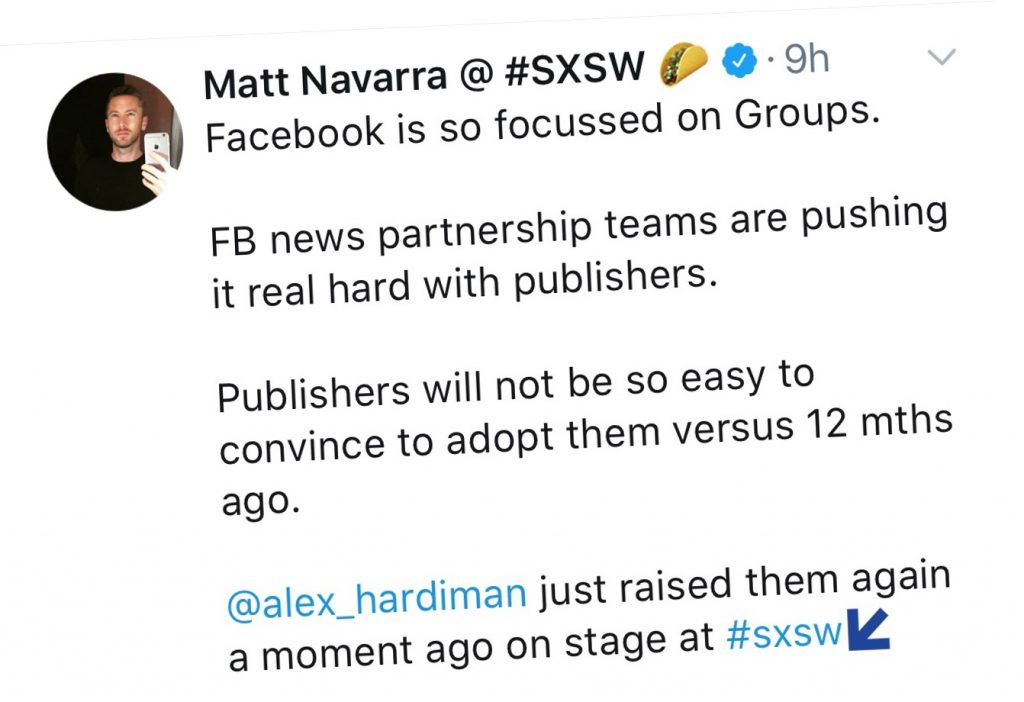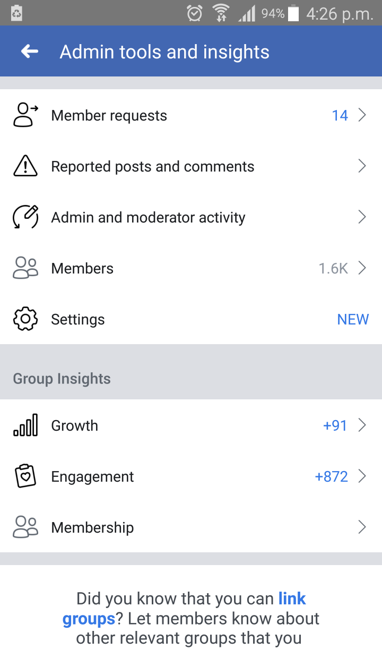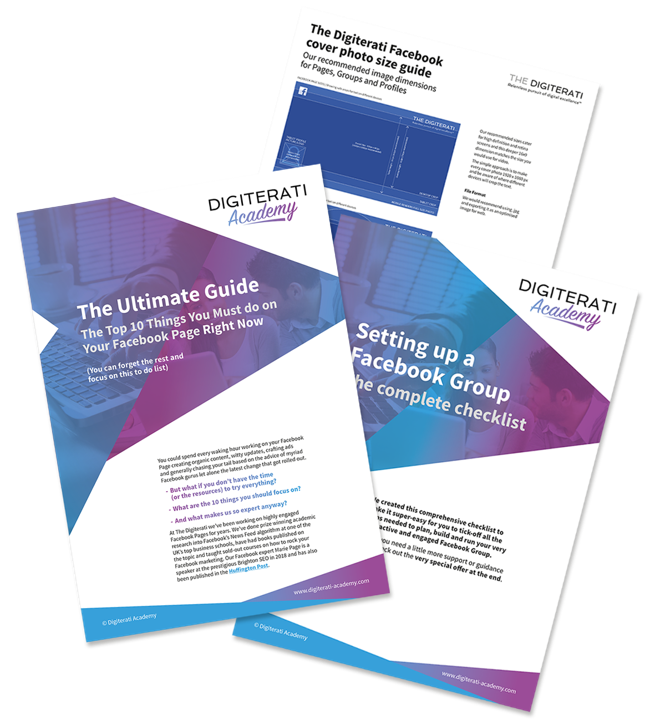Marie Page’s conference talk at BrightonSEO
Transcript for the video and BrightonSEO conference talk:
Over a year ago the media started reporting on a phenomenon called Context Collapse. Facebook was apparently terrified because despite spending increasing amounts of time on the platform people were sharing less and less intimate information about themselves.
We’ve since seen a slew of new features such as “On This Day” that encourage people to share updates.
But the behavioural change was already firmly set in and since then Facebook has made further changes.
At the heart of this was a change of mission statement aiming to “Give people the power to build community and bring the world closer together”
Then in January this year a major announcement was made which was heralded as the Facebook Apocalyse or Facebook Zero. It appeared that Pages could be facing an era of zero organic reach.
Facebook decided it was sick of passive consumption of content and will, in future, be focusing on pushing out content that drives meaningful interactions with a focus on content from friends and family rather than businesses.
And certainly organic reach is low, and for many Pages in freefall.
Average reach is currently around 7% but some Pages have seen it much lower than that, particularly those using click and engagement bait tactics.
The Oatmeal has neatly summarised what has happened over the years:
So Facebook Pages are now a total nightmare, especially for organisations without a lot of budget to spend boosting posts.
But Facebook Groups are different.
At least for now.
Groups have more of a community feel and because Groups are generally not public, people feel safer to talk and engage. They know they are in a community of like minded people.
Queen of Facebook Mari Smith is a fan of Facebook Groups. “People love to belong, especially to a community of like-minded individuals and businesses. They like to have a safe environment where they feel they can open up a bit more, be among the first to hear breaking news, or share fresh ideas with one another.”
And Facebook itself is focussed on Groups.
If you are going to be putting Facebook at the heart of your marketing it is wise to go where it leads.
Here’s Matt Navarra tweeting from South by Southwest about an interview with Alex Hardiman, Head of News Products:
In an interview with Wired on the recent algorithm changes Head of News Feed Adam Mosseri said “There will be more friend content and family content. There will also be more group content. Group content tends to inspire a lot of conversation. Communities on Facebook are becoming increasingly active and vibrant”.
Why fight the News Feed algorithm if you can work with it instead?
But can Facebook Groups work for commercial brands?
Yes!
It just requires a longer term view and something of a paradigm shift.
Groups enable a multi-person conversation that you are far less in control of.
Groups won’t work as interruptive marketing. Because of context collapse, with so many of our Page Posts we feel as if we are speaking into a vacuum but with the equivalent content in a Group you are way more likely to end up with detailed discussion.
The best Groups are where members feel a sense of ownership and any brand behind the Group spends most of the time playing a facilitation role.
In a world where millions are spent on sponsorship I simply don’t understand why Facebook Groups have not enjoyed more take-up by commercial brands
So why are Groups so much better than Pages?
Well reach is soooo much better
In any given month I am seeing a reach of 60-70% (here’s how you calculate reach in a Group) with top performing posts getting about 30-50% reach.
Engagement is through the roof in comparison to the equivalent Page. The News Feed algorithm loves that active engagement which further pushes reach.
And the engagement tends to be peer-to-peer rather than driven by Group Admins which again the algorithm, in it’s new incarnation, loves.
You’ll also find plenty of user generated content. In a Group UGC enjoys the same prominence as posts by Admins, which evens the playing field and reinforces that democratic, community feel. Of course for brands used to controlling their content tightly, this can present something of a challenge – as I said, Groups can require a paradigm shift.
How to sell it in
So far so good. What’s not to love about Facebook Groups?
Well they appear to still be pretty hard to sell in at Board level. So what other arguments can you put forward?
Customer service where other customers do half the work for you.
Groups can provide a customer service option that takes the load off your own internal teams.
Dell did this years about with their Dell Community. Independent experts and tech enthusiasts solve Dell technical issues in a forum Dell hosts but does not provide staff support to. All saving Dell money. The customers are happy because they get timely support and the enthusiasts get the badge of Dell Rockstar.
Some people are easily pleased!
Facebook Groups are also a quick way of getting messages out
Afterall, if Kennedy was shot today it’s likely that the first place we’d here about it would be Facebook.
That problem of reach is not going to deliver such guaranteed exposure with a post on a Page
Peer-to-peer advice and support
As well as the kind of user generated content we’ve already looked at, Groups tend to be a place where users ask loads of really useful and interesting questions.
As a content marketer, this is my happy place.
Discover (and address) your customer pain points
If you know the Business Model Canvas you’ll be familiar with the concept of customer pain points
Again as a content marketer, hosting a community where these pain points are raised, and with our solutions only a click away makes a lot of marketing sense.
People will post questions looking for advice. And these will often be answered comprehensively by the community. If not you can answer them yourselves and, if appropriate, position your own products and services as a possible solution. They also provide the business with content ideas for blog posts, ads and even new products
Position you as an expert
Simply by actively hosting a Group helps position you, and your team, as an expert.
And as time goes on you demonstrate that with your own content and response to questions.
Normally the community *can* and will answer even the trickiest of questions. But if they don’t I find that it’s rare one of our internal team can’t Google a response even if we don’t know it immediately ourselves.
Profile raising without overtly selling
A Group provides you the opportunity to showcase your expertise, the leader in your field with your finger firmly on the pulse of what’s new and what’s worth investigating.
Enable you to sell in
I don’t advocate lots of overt selling in Groups but you earn the right to do so occasionally as the Group host.
For example, one of our members on the Team Digiterati Facebook Group asked for advice on Facebook ads to promote an upcoming crowdfunder. I responded with a detailed response offering a bunch of advice. I included some links to guides I’d written on the topic and to the Facebook ads course in the Digiterati Academy. Of course if I wanted to I could also follow up with a PM and offer some further possibly paid support. Note how much of this response was freely given before offering some paid options.
Tell stories, show the people behind the brand
People buy from people not websites, bringing connection between your in-house team and your prospective customers is going to drive sales. The Group will also bring connection between customers who will grow into a loyal tribe that loves your Group and advocates for you.
Groups are a place for the brand to tell stories (you don’t need me to argue on how important stories are too good marketing). You’ll also find that Group members begin to share stories relevant to the brand, perhaps even stories about your products or services in use.
Free market research and feedback
Groups are a great place for on-the-ground market research
As well as giving insight into your customers you’ll get ideas and inspiration for new content across all social channels
Use it to improve your products/processes.
You’ll also uncover work to be done on product improvement and new product development ideas.
Customer advocacy
Groups are simply brilliant places for your community to advocate for you. We find that if someone kicks off, we rarely need to do anything ourselves because our community rally round and put the record straight. You’ll also get unprompted testimonials which will help convert others at an earlier stage of the customer journey.
Practical input on launching a Group for the first time
Prior to launching your Group getting your ducks in a row is important. You’ll need assets in place from cover photos to admins as well as rules, Group settings and a bunch of agreed processes and procedures.
You may want to canvas opinion on the viability of a Group, talk about it on your Facebook Page. I did this when I was considering creating a Group for Musicademy (a training company I run for church-based musicians). I was so overwhelmed by the positive response that I pretty rapidly got to work making it happen.
Posting on the Facebook Page about the potential Groups generated buzz ahead of launch which meant that on launch day people were aware and ready to join.
When we worked with Motability to create a Facebook Group the pre-launch process took many months. We were working with Motability for two years before we finally persuaded them to take the plunge and form a Group. They are sensibly risk-averse and were concerned about any potential bad publicity and lack of control.
But conversely (and partly because they are such a superb and caring organisation that delivers what it promises), the newly created Group has been awash with praise.
The Group is likely to be biggest Facebook Group in the world for people with disabilities. And it is all “sponsored” by a key commercial player in that space with a focus in the content on cars, mobility and freedom of movement.
In the pre-launch period we provided a series of training days educating the team about how Groups worked and looking in detail at how to launch and manage what we knew would very rapidly be a very busy online space.
Having got buy-in across the organisation, and all the assets in place Motability chose to have a pilot phase with a few key invited members before going for a soft launch initially via their Facebook Page and then later by email.
How to promote your Group in a Facebook Ad
Clicks to website ads work for public Groups but not for closed or secret Group. However there are three workarounds you can use instead:
- Use a url shortener to bypass the facebook.com domain restriction in the ads create tool
- Use a link ad and send to a web page that has a forwarder in place to the Facebook Group
- Create a post on your PAGE with a link to the Group
Boost that post
Don’t accept everyone!
Tempting as it is to have a vanity metric of tens of thousands of members, large Groups are massively time consuming to manage and a magnet for spammers so set your membership criteria. The tighter your criteria the less hassle you will have with spammy posts annoying members and causing you admin headaches.
Some Groups are offered only as part of a VIP membership package. Jon Loomer’s Power Hitters Club is a good example. You get access to Jon as well as all the training on his website.
Theme days
Theme days work well for when the Group is a little quiet.
I don’t follow them religiously though. I tend to “feel” what is needed rather than sticking to a strict schedule.
Our Friday Free For All theme day works well as a thread where members are allowed to push out their own self promotion. So these include links to their own projects and websites. Keeping them in a single thread minimises the timeline spam for everyone else.
Work up other theme days in keeping with your overall content marketing strategy and also something that pushes the buttons of your community – scratching where they are itching.
Admin tools
Recognising the time running a Group can take, Facebook is pulling together the 6 or 7 most important things Admins do in keep membership and conversation healthy to a single Admin Tools hub:
The hub should streamline workflow and release admins to spend their time attending to people rather than doing admin.
Things Admins can do include:
- Mute and ban members,
- message members
- Schedule posts
- View the activity of other Admins and moderators
- And see which posts have been reported to Admins or to Facebook
Recent new features for Facebook Groups
Facebook has invested heavily in improving the functionality of Groups in the last few months. Features include:
- The ability to link your Page to a Group
- And link Groups to Groups
- You can post as the Page in a Group – this is great for Groups that need to protect the identity of Admins, for instance when dealing with vulnerable people
- Group Insights are now also available
Coming Soon to Facebook Groups
Facebook has trailed a number of features that are coming soon to Groups. These include:
- Personalisation – colours and theme
- Prominence of Rules
- Multiple Pinned Posts
We’ve also seen some trials of Boosted posts. It does indeed look as if advertising is coming to Groups
Tricks and Tips
Finally a trick and a tip for running your Group:
Data capture new members
You get to ask up to 3 questions when people apply to join the Group. Offer a freebie in return for the customer email address. This is a classic funnel marketing approach.
Stay out of jail
Facebook is increasingly throwing people into Facebook Jail for their online misdemeanours.
Don’t auto add people to the Group without permission. Don’t PM people you don’t know asking them to join the Group. And don’t post too often especially if content is spammy/salesy.
It doesn’t take many complaints to trigger jail time
Free stuff from The Digiterati
You are also welcome to grab some freebies from us.
These include our:
- Facebook cover photo size guide and Photoshop template
- Checklist for setting up a Facebook Group
- The Ultimate Guide to Facebook Marketing
Get the bits of Marie’s talk that didn’t make the cut for BrightonSEO
Most BrightonSEO talks are just 20 minutes long. It’s tough cramming everything into a topic in that time. So inevitably I ended up culling a lot of my slide deck. Watch the video and blog post on the bits that got edited out. Still super useful for anyone about to launch or thinking about launching a Facebook Group.
- How to set up appointments on your Facebook Page - 19th March 2019
- Social media content idea: WordSmith Cards - 11th March 2019
- Facebook for small businesses in 2019: a Q&A - 7th March 2019
- Is it best to boost a post on Facebook, promote a post or create an ad? - 13th October 2018
- What is the difference between a boosted post, a promoted post and a Facebook ad? - 13th October 2018
- How not to £@%!-up on social media! - 24th September 2018




